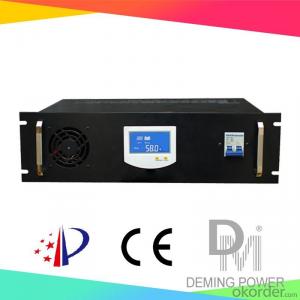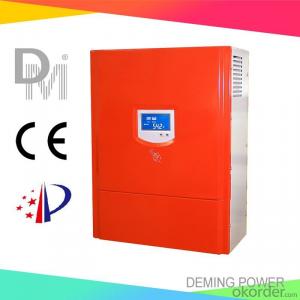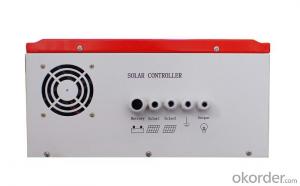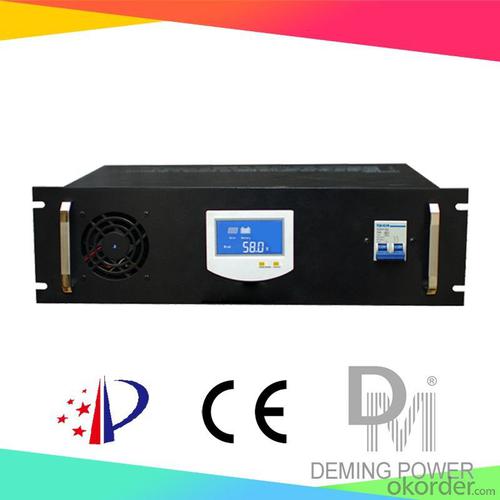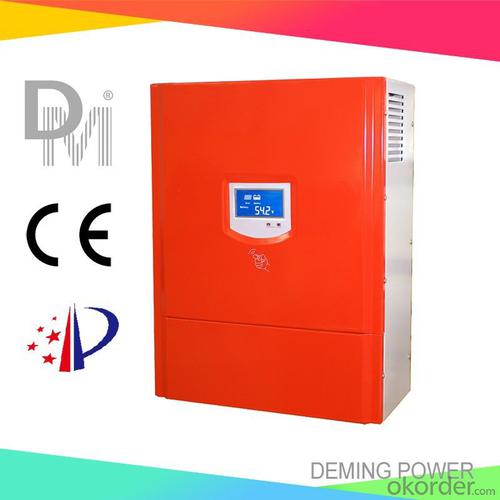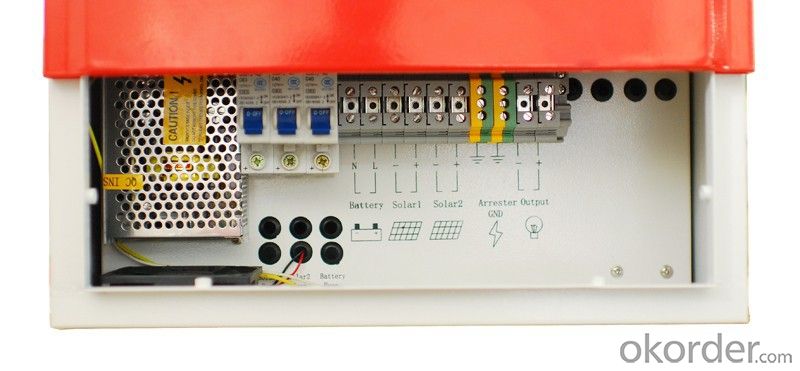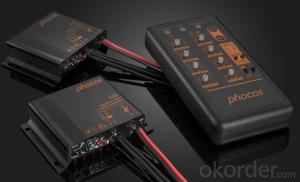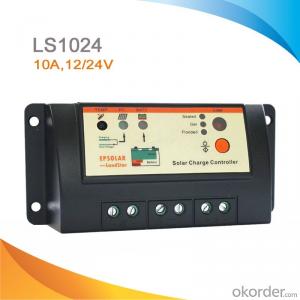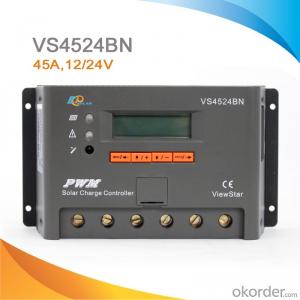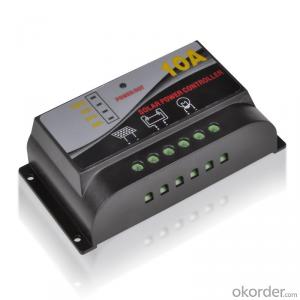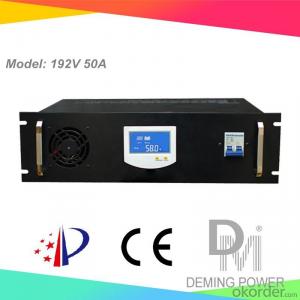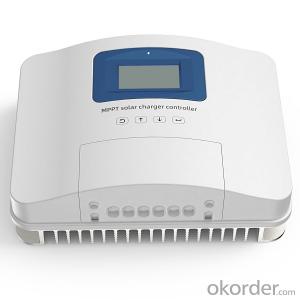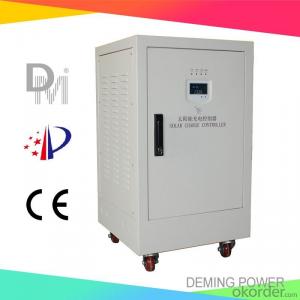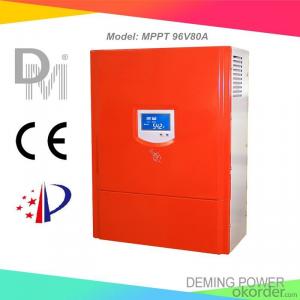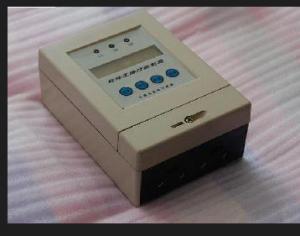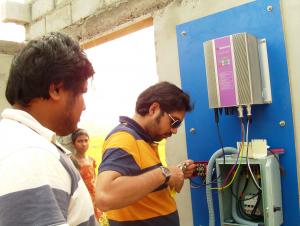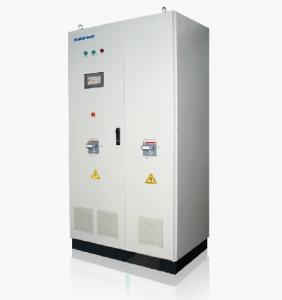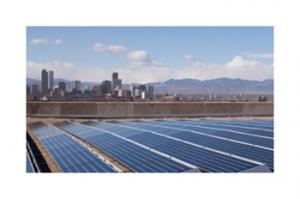High Voltage Solar Controllers - MPPT Solar Charge Controller 96V 60A for Off Grid Solar Power System and RS485 Available
- Loading Port:
- Qingdao
- Payment Terms:
- TT OR LC
- Min Order Qty:
- 1 PCS
- Supply Capability:
- 1000 PCS/month
OKorder Service Pledge
OKorder Financial Service
You Might Also Like
Properties of the solar charge controller
1. Design for off-grid solar power system.
2. Applicable to different kinds of batteries.
3. Adopts MPPT technology (Maximum Power Point Tracking). The advanced tracking algorithm make the solar module operate at ideal voltage which the solar modules can produce the maximum available power.
4. Modular design with simple structure and easy maintenance.
5. Automatic power control function.
6. LCD display: Solar panel current, solar panel voltage, solar panel power, battery group voltage, charge current.
7. Perfect protection function: Solar reverse charge protection, Solar reverse connection protection, Battery reverse connection protection, Battery overcharge protection, Battery over current protection etc ,thus the system has higher reliability.
Technical parameters of the solar charge controller
Model | 96V60A | ||
Battery group rated voltage | 96Vdc | ||
PV Rated current | 60A | ||
PV open circuit voltage | 400V | ||
PV Max. power | 5760Wp | ||
MPPT input DC voltage rang | 80-116Vdc | ||
Input PV module road number | 1 | ||
Function | MPPT charge mode, auto stop charge, auto recharge voltage; Protection: connecting contrary, over current, short circuit, over heat etc. | ||
Display mode | LCD | ||
Display content | solar panel voltage, solar panel current, solar panel power, battery voltage, charge current | ||
Floating Charge Voltage (adjustable) | 110Vdc | ||
Stop charge voltage | 116Vdc±2% | ||
Recharge voltage | 108V±2% | ||
Voltage drop between PV and battery | 1.5V | ||
Max itself power consumption | 100mA-150mA | ||
Work environment temperature | -30-60°C | ||
Relative humidity | 90% No condensation | ||
Applicable altitude | 3000m The rated power should be reduced when it is higher than 2000m | ||
Noise (1m) | 40dB | ||
Degree of protection | IP20(Indoor) | ||
Cooling method | Forced air cooling | ||
*Communication interface (optional) | RS485/USB | ||
*Temperature compensation(optional) | -4mv/°C/2V,-35°C~+80°C,Accuracy:±1°C | ||
Product size (mm) | 520*430*200mm, 480*360*150mm | ||
Weight(kg) | 13Kg, 18kg | ||
*Above parameter only for reference. Could be custom made to user specifications.
- Q: How does a solar controller prevent damage to the solar panels from overvoltage conditions?
- The flow of electricity from the solar panels to the battery or grid is regulated by a solar controller to prevent damage to the panels caused by overvoltage conditions. Acting as a bridge between the panels and the battery or grid, it guarantees that the voltage output from the panels remains within safe limits. When generating electricity, the solar panels produce a voltage that varies depending on the intensity of sunlight. However, this voltage can fluctuate due to factors like weather conditions and panel temperature. Exceeding the safe operating range can result in panel damage. Constantly monitoring the voltage output from the panels, the solar controller activates a mechanism to prevent excess voltage from reaching the panels if it detects that the voltage is too high. Depending on the type of solar controller, this mechanism can involve techniques such as pulse width modulation (PWM) or maximum power point tracking (MPPT). PWM controllers regulate the voltage by rapidly switching the connection between the panels and the battery on and off. This effectively reduces the average voltage reaching the panels, preventing overvoltage conditions. On the other hand, MPPT controllers optimize energy conversion by adjusting the electrical load to extract maximum power from the panels without exceeding the safe voltage threshold. In both cases, the solar controller ensures that the voltage output from the panels remains within the specified range, safeguarding them from potential damage. Advanced solar controllers may also incorporate features such as temperature compensation to account for temperature variations, further enhancing the protection of the panels. In conclusion, a solar controller safeguards the solar panels from damage caused by overvoltage conditions by regulating and controlling the voltage output from the panels. Techniques like PWM or MPPT are employed to keep the voltage within safe limits. This protection mechanism prolongs the lifespan and enhances the efficiency of the panels, maximizing their performance and return on investment.
- Q: Can a solar controller be used with solar-powered indoor educational systems?
- Yes, a solar controller can be used with solar-powered indoor educational systems. A solar controller helps regulate and optimize the charging and discharging of batteries in a solar system, ensuring proper utilization of solar power. Whether the educational system is located indoors or outdoors, a solar controller can effectively manage the flow of solar energy and maintain the batteries' health and longevity.
- Q: How does a solar controller prevent damage to the solar panels from environmental pollutants?
- A solar controller prevents damage to the solar panels from environmental pollutants by regulating the flow of energy between the panels and the batteries. It ensures that the panels do not receive excessive voltage, which can lead to overheating and damage. Additionally, the controller helps minimize the impact of pollutants such as dust, dirt, and debris by controlling the charging process and preventing the accumulation of harmful substances on the panels.
- Q: Can a solar controller be used with a solar-powered agricultural irrigation system?
- Yes, a solar controller can be used with a solar-powered agricultural irrigation system. A solar controller is designed to regulate and optimize the performance of solar panels, batteries, and other components in a solar power system. It helps to manage the charging and discharging of batteries, control the flow of electricity, and ensure efficient energy usage. In the case of a solar-powered agricultural irrigation system, a solar controller can play a crucial role in maintaining the proper functioning of the system. It can monitor the energy production from the solar panels and regulate the charging of batteries to ensure a steady and reliable power supply. This is especially important for irrigation systems as they often require a continuous power source to pump water and operate other components. Furthermore, a solar controller can also help in controlling the timing and duration of irrigation cycles. It can be programmed to activate the irrigation system during specific daylight hours when solar energy production is at its peak. This helps in maximizing the use of solar power and reduces the dependency on grid electricity or backup generators. Overall, a solar controller is a valuable component in a solar-powered agricultural irrigation system as it enhances the efficiency, reliability, and sustainability of the system.
- Q: Can a solar controller be used with solar panels of different voltages?
- No, a solar controller should not be used with solar panels of different voltages. The solar controller is designed to match the voltage output of the solar panels to the voltage requirements of the battery or load. Using solar panels with different voltages can potentially damage the solar controller and lead to inefficient energy conversion. It is recommended to use solar panels with the same voltage when using a solar controller.
- Q: Can a solar controller be used with a solar-powered university or college?
- Yes, a solar controller can be used with a solar-powered university or college. A solar controller is an essential component of a solar power system that regulates the voltage and current flow from the solar panels to the battery. It ensures the efficient and safe charging of the batteries, which are used to store the solar energy generated. Therefore, a solar controller is necessary to effectively manage and utilize the solar power in a university or college setting.
- Q: Can a solar controller be used with a solar-powered well pump?
- Yes, a solar controller can be used with a solar-powered well pump. A solar controller helps regulate the flow of electricity from the solar panels to the pump, ensuring optimal performance and preventing overcharging or battery damage. It also allows for monitoring and adjusting the system's operation based on sunlight conditions.
- Q: Can a solar controller be used with solar-powered remote monitoring systems?
- Yes, a solar controller can be used with solar-powered remote monitoring systems. A solar controller regulates the electrical charge from solar panels and ensures the batteries are charged efficiently. This is crucial for remote monitoring systems as it helps maintain a steady power supply and prolongs the battery life, enabling continuous and reliable operation.
- Q: Solar controller red light flashing
- Installation of the controller should pay attention to: 1, waterproof; some of the controller on the market is not easy to produce waterproof, easy to penetrate the water vapor in the poles, resulting in short circuit and other issues; 2, pay attention to the controller and system rationality, 3, the main function of the controller is to protect the battery, must pay attention to.
- Q: Can a solar controller be used with a solar-powered data center?
- Yes, a solar controller can be used with a solar-powered data center. A solar controller regulates the flow of energy from the solar panels to the batteries, ensuring efficient charging and preventing overcharging. It can help manage and optimize the solar power generation and distribution within a data center, ensuring a reliable and sustainable energy supply.
Send your message to us
High Voltage Solar Controllers - MPPT Solar Charge Controller 96V 60A for Off Grid Solar Power System and RS485 Available
- Loading Port:
- Qingdao
- Payment Terms:
- TT OR LC
- Min Order Qty:
- 1 PCS
- Supply Capability:
- 1000 PCS/month
OKorder Service Pledge
OKorder Financial Service
Similar products
Hot products
Hot Searches
Related keywords
